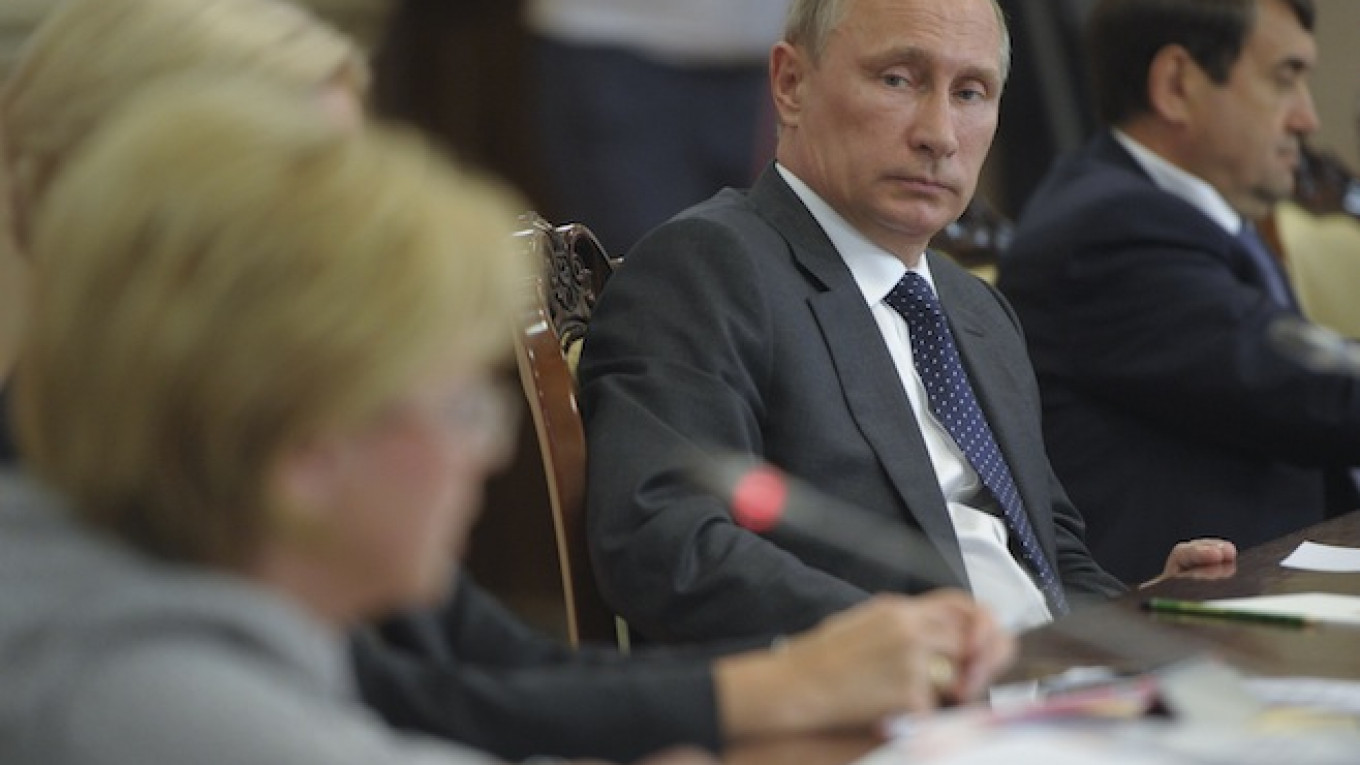President Vladimir Putin, senior government officials and a number of lawmakers will visit Crimea next week, sources said, in a defiant show of support for Russia's annexation of the Black Sea region despite tough new Western economic sanctions.
Russia annexed Crimea from Ukraine in March after pro-Western protesters in Kiev drove from power a president with close ties to Moscow. The West condemned the move and imposed visa bans and asset freezes on some senior Russian officials.
Last week, after months of worsening tension, the U.S. and the European Union announced much tougher economic sanctions against Moscow over what they say is its support for pro-Russian separatists in eastern Ukraine.
A source from the pro-Kremlin United Russia party said Tuesday that most of the 450 lawmakers from the State Duma lower house of parliament were expected to join Putin and Prime Minister Dmitry Medvedev in Crimea for talks on August 14.
A Kremlin source confirmed plans for the trip but would not elaborate, while a Kremlin spokesman declined comment. A government spokeswoman also declined to comment when asked whether Medvedev would join Putin in Crimea.
"The main message [of the trip] is political, to show that Crimea is an integral part of Russia and that there's no turning back despite the sanctions," the United Russia source said, adding that all 450 Duma deputies were unlikely to make the trip since the parliament will be in recess.
Impact of Sanctions on Agenda
Asked about Putin's agenda in Crimea, the source said it would include talks on domestic issues, including the strains on the state budget, how to cover the cost of social programmes, given Russia's economic slowdown, and plans to develop Crimea.
Global issues, including the Western sanctions against Russia, will also be on the agenda, the source added.
"They will speak about global issues: what we do next and how we carry on overall," he said.
The annexation of Crimea triggered a wave of patriotic euphoria in Russia and sent Putin's approval ratings to new highs. Only a handful of opposition politicians dared to criticise what state media described as a "reunification".
Crimea, famed for its lush climate, summer resorts and rich literary associations, is largely populated by ethnic Russians. Moscow presented the region as a gift to Ukraine from Russia in the 1950s when both were firmly united within the Soviet Union.
Russian officials have said they could invest up to 1 trillion roubles ($30 billion) to develop Crimea, though this would put a significant strain on state finances as economic growth has almost ground to a halt and capital flight has soared amid the worsening standoff with the West.
Under its new sanctions, the EU has restricted access to European capital markets for five major Russian state-owned banks and also targeted Russia's defence and oil sectors.
The U.S. has imposed similar sanctions on three major state-owned banks and one defence company.
On Tuesday, Russian news agencies quoted Putin as ordering the government to prepare retaliatory measures against Western countries.
See also:
Putin Lands in Crimea For Victory Day in First Visit Since Annexation
A Message from The Moscow Times:
Dear readers,
We are facing unprecedented challenges. Russia's Prosecutor General's Office has designated The Moscow Times as an "undesirable" organization, criminalizing our work and putting our staff at risk of prosecution. This follows our earlier unjust labeling as a "foreign agent."
These actions are direct attempts to silence independent journalism in Russia. The authorities claim our work "discredits the decisions of the Russian leadership." We see things differently: we strive to provide accurate, unbiased reporting on Russia.
We, the journalists of The Moscow Times, refuse to be silenced. But to continue our work, we need your help.
Your support, no matter how small, makes a world of difference. If you can, please support us monthly starting from just $2. It's quick to set up, and every contribution makes a significant impact.
By supporting The Moscow Times, you're defending open, independent journalism in the face of repression. Thank you for standing with us.
Remind me later.






